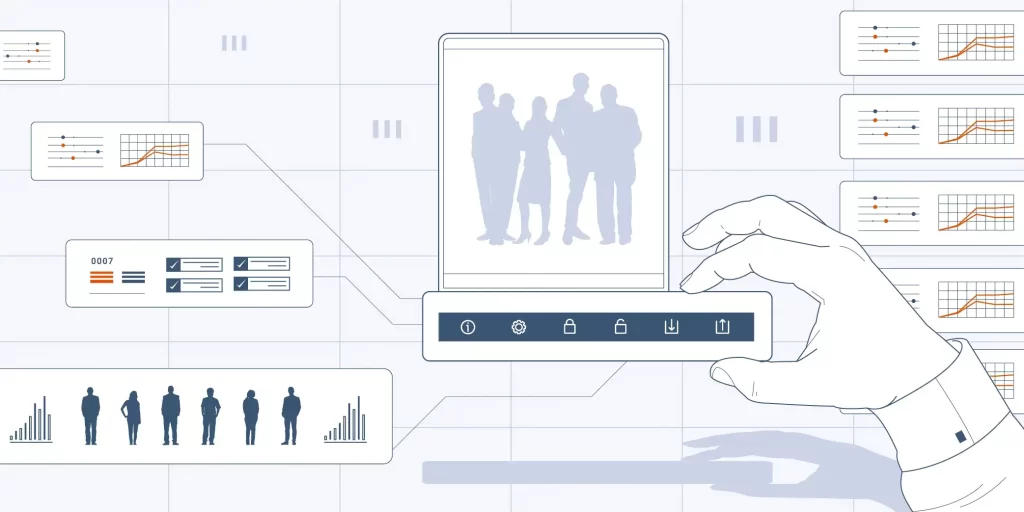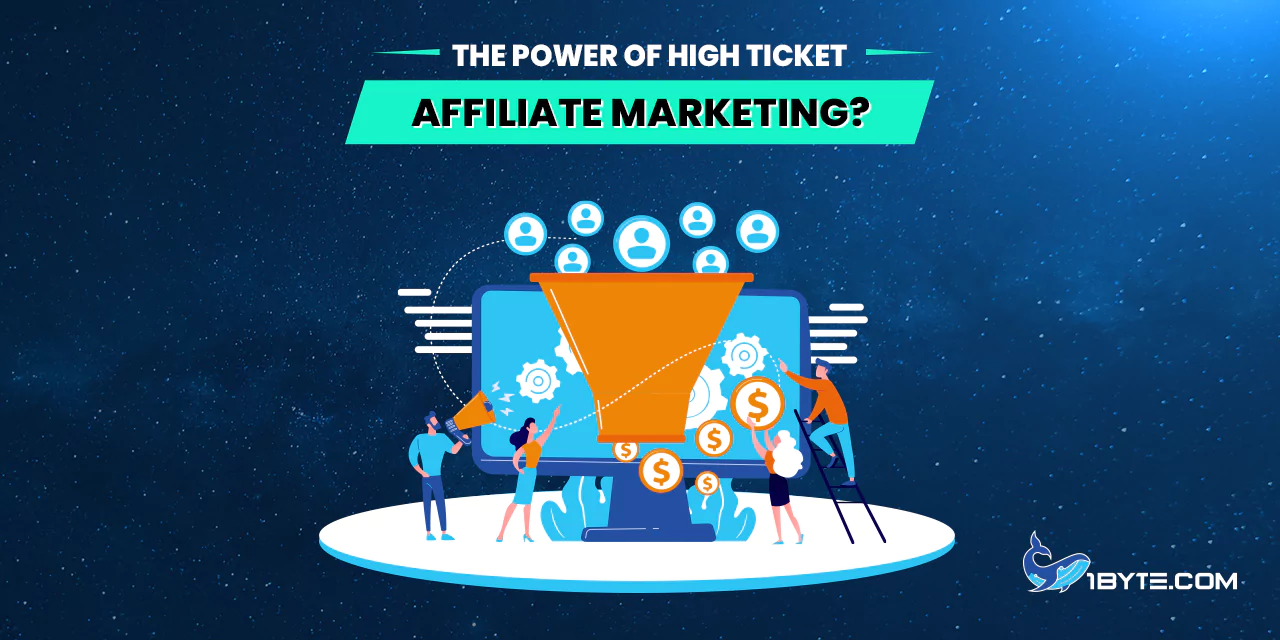In the dynamic realm of affiliate marketing, where opportunities abound for both newcomers and seasoned marketers, a potent strategy known as “high ticket affiliate marketing” has been gaining remarkable traction. With high ticket affiliate marketing, the potential for substantial earnings beckons like never before. This article dives deep into the world of high ticket affiliate marketing, exploring its nuances, advantages, and proven strategies that have empowered marketers to realize substantial returns on their efforts. Whether you’re just starting or looking to level up your affiliate marketing game, understanding the power of high ticket affiliate marketing is a pivotal step toward maximizing your income potential in the digital landscape.
What is High Ticket Affiliate Marketing?
High ticket affiliate marketing, a pivotal strategy in the affiliate marketing landscape, offers marketers the prospect of substantial earnings.
Definition of High Ticket Affiliate Marketing
High Ticket Affiliate Marketing, in its essence, is a dynamic strategy employed in affiliate marketing that focuses on the promotion and sale of premium-priced products or services. In this approach, marketers collaborate with businesses or merchants offering high-value items, and they earn significant commissions for successful referrals or sales.
Unlike conventional affiliate marketing, where marketers often promote lower-priced goods with smaller commission margins, high ticket affiliate marketing involves promoting products or services with substantial price tags. These products can range from premium software suites and high-end electronics to exclusive courses and luxury items.
The allure of high ticket affiliate marketing lies in the potential for larger commission earnings per sale. Marketers can earn substantial amounts even with a relatively low number of conversions due to the higher price point of the products they promote.
To illustrate, consider a scenario where a marketer promotes a high-end online marketing course with a price tag of $2,000 and earns a 40% commission for each successful sale. If they manage to secure just ten sales, their earnings would amount to $8,000. This is a stark contrast to promoting lower-priced products, where a higher volume of sales would be required to reach a similar income level.
Contrasting high ticket with low ticket affiliate marketing
Contrasting high ticket with low ticket affiliate marketing reveals the fundamental differences in how these strategies operate within the affiliate marketing landscape. High ticket affiliate marketing revolves around the promotion of products or services with substantial payouts, often exceeding $100 and reaching as high as five figures.

In contrast, low ticket affiliate marketing focuses on promoting items with smaller payouts. These products typically have lower price points, making them more accessible to a broader audience.
Examples of high ticket affiliate programs include Capitalist Exploits, offering a 50% commission with a minimum payout of $750 per sale, and the Authority Hacker course, which offers commissions of up to $1,979 per sale.
Low ticket affiliate marketing, on the other hand, involves promoting items like checklists, templates, and recipes, which usually yield smaller commissions. While high ticket promotions may have a lower conversion rate due to their higher price, low ticket promotions often enjoy a higher conversion rate, with approximately 20% on a good day.
The key distinction lies in the potential earnings per sale. High ticket affiliates may earn substantial amounts from a few successful referrals, while low ticket affiliates rely on a larger volume of sales to achieve comparable income levels.
Understanding these differences is crucial for affiliate marketers, as it influences their choice of products to promote and their overall marketing strategies. In the following sections, we will explore the advantages and strategies specific to high ticket affiliate marketing, shedding light on how marketers can harness its power for financial success.
Recommended reading: What is Affiliate Marketing?
2 Advantages of High Ticket Affiliate Marketing
High ticket affiliate marketing offers distinct advantages that can significantly impact a marketer’s earning potential. In this section, we will explore two key benefits that set high ticket affiliate marketing apart from other affiliate strategies.
The potential for higher commissions
The potential for higher commissions in high ticket affiliate marketing is a game-changer for marketers seeking substantial earnings. Unlike low ticket affiliate marketing, where commissions from each sale are relatively small, high ticket affiliate marketing offers the allure of more substantial payouts.

When marketers promote products or services with premium price tags, they open the door to earning higher commissions with every successful referral. This means that with just a few conversions, high ticket affiliate marketers can accumulate significant income.
For example, imagine a high ticket affiliate marketer promoting a luxury travel package that costs $5,000 and offers a 20% commission. With just one sale, they earn $1,000 in commission. In contrast, a low ticket affiliate marketer promoting a $50 product with a 5% commission would need 40 sales to achieve the same earnings.
This difference in earning potential is a compelling reason why many affiliate marketers gravitate toward high ticket affiliate marketing. It allows them to focus their efforts on quality over quantity, concentrating on driving conversions for higher-priced items rather than chasing a large volume of low-value sales.
The value of fewer conversions
The value of fewer conversions in high ticket affiliate marketing cannot be overstated. It’s a strategy where quality triumphs over quantity, and each conversion carries significant weight.
When promoting high-priced products or services, affiliate marketers don’t need to secure a large number of conversions to achieve substantial earnings. Even a handful of successful referrals can result in significant income due to the higher commissions associated with high ticket items.
This is in stark contrast to low ticket affiliate marketing, where marketers often need to generate numerous conversions to see meaningful returns. With high ticket affiliate marketing, fewer conversions mean less effort spent on acquiring customers, allowing marketers to focus on delivering exceptional value to their audience.
Additionally, the value of fewer conversions extends beyond the initial sale. High ticket affiliate marketers often benefit from customers who are more engaged and invested in their purchase. These customers are more likely to remain loyal, resulting in long-term recurring revenue.
Recommended reading: How to Use the Affiliate Program at 1Byte
Strategies for Success in High Ticket Affiliate Marketing
To excel in the realm of high ticket affiliate marketing, marketers must employ specific strategies tailored to the unique dynamics of this lucrative field. While the potential for substantial earnings is enticing, it requires a strategic approach that goes beyond conventional affiliate marketing methods.
Identifying and selecting high ticket affiliate programs
Identifying and selecting high ticket affiliate programs is a crucial step for success in high ticket affiliate marketing. The choice of affiliate programs can significantly impact your earning potential in this lucrative field. Here are some key strategies for effectively identifying and selecting high ticket affiliate programs:
- Research Potential Programs: Start by conducting thorough research to identify high ticket affiliate programs that align with your niche or target audience. Look for programs that offer generous commissions for selling expensive products or services.
- Evaluate Commission Structure: Examine the commission structure of each program. High ticket affiliate programs typically offer larger commission percentages or fixed amounts per sale. Consider programs like Capitalist Exploits, which offers a 50% commission with a minimum payout of $750 per sale.
- Minimum Payouts: Take note of the minimum payout requirements. Some high ticket affiliate programs may have minimum thresholds that you need to reach before receiving commissions. Ensure these requirements are reasonable and achievable.
- Recurring Revenue: Look for programs that offer recurring monthly revenue. For example, Kinsta provides both upfront payouts ranging from $50 to $500 per sale and a 10% recurring monthly revenue share.
- Product Quality and Reputation: Assess the quality and reputation of the products or services you’ll be promoting. High ticket items should provide real value to customers, which can enhance your credibility as an affiliate marketer.
- Affiliate Support: Check if the affiliate programs offer adequate support and resources for affiliates. Access to marketing materials, tracking tools, and responsive support teams can make your affiliate journey smoother.
- Competitive Landscape: Analyze the competition within your chosen niche. Consider whether other affiliate marketers are promoting the same products or if there’s a gap in the market that you can fill.
- Long-Term Viability: Think about the long-term viability of the products or services you’ll be promoting. High ticket affiliate marketing can lead to substantial earnings, but it’s essential to ensure that the products have lasting demand.
By carefully selecting high ticket affiliate programs that align with your niche, offer competitive commissions, and provide valuable resources, you can lay a strong foundation for success in high ticket affiliate marketing.
Building a targeted audience or niche
Building a targeted audience or niche is a fundamental strategy for success in high ticket affiliate marketing. To effectively promote high-priced products or services, affiliate marketers must identify and engage with a specific audience that has a genuine interest in those offerings. Here’s how to build a targeted audience or niche:
- Market Research: Begin by conducting thorough market research to identify a niche or audience segment that is interested in the high ticket products or services you plan to promote. This research can involve analyzing keywords, competition, and consumer behaviors.
- Define Your Niche: Once you’ve identified a potential niche, define it clearly. Determine the specific needs, preferences, and pain points of your target audience within this niche. This clarity will guide your content and marketing efforts.
- Create Relevant Content: Develop content that addresses the unique interests and challenges of your chosen niche. Content can take the form of blog posts, videos, social media updates, or other formats that resonate with your audience.
- Leverage SEO: Implement search engine optimization (SEO) strategies to ensure that your content ranks well in search engine results. This will help attract organic traffic from individuals searching for information related to your niche.
- Engage on Social Media: Engage with your audience on social media platforms where they are active. Share valuable content, participate in discussions, and build a community around your niche.
- Email Marketing: Utilize email marketing to nurture relationships with your audience. Send targeted messages, promotions, and updates that cater to their interests and needs.
- Paid Advertising: Consider using paid advertising, such as pay-per-click (PPC) advertising, to reach a wider audience within your niche. Target your ads to specific demographics and interests.
- Continuous Learning: Stay updated on industry trends and developments to better serve your niche audience. The more you understand their evolving needs, the more effectively you can promote high ticket products or services to meet those needs.
Content creation and promotion tactics
In the realm of high ticket affiliate marketing, content creation and promotion tactics are vital for success. To effectively promote high ticket affiliate products, affiliate marketers employ various strategies.

One common tactic is to create high-quality content that educates and engages the target audience. This content often includes blog posts, videos, and reviews that highlight the benefits and features of the high ticket products.
To maximize the impact of their content, affiliate marketers optimize it for search engines. They use relevant keywords, including the focus keyword “high ticket affiliate marketing,” to improve their content’s visibility in search results.
Additionally, they make use of social media platforms to promote their content. Sharing informative posts, videos, and reviews on platforms like Facebook, Instagram, and Twitter can help reach a broader audience.
Email marketing is another effective strategy in high ticket affiliate marketing. Marketers build email lists and send out newsletters with valuable content and affiliate product recommendations.
Collaboration with influencers can also boost promotion efforts. Affiliate marketers partner with individuals who have a substantial online following to endorse the high ticket products, gaining credibility and trust.
Paid advertising, such as Google Ads and Facebook Ads, is a valuable tool in the arsenal of high ticket affiliate marketers. These ads are strategically targeted to reach potential customers interested in the promoted products.
Engaging with the audience is crucial. Affiliate marketers respond to comments and questions, fostering a sense of community and trust among their followers.
Leveraging email marketing for high ticket affiliate products
Email marketing is a potent tool in high ticket affiliate marketing. It plays a crucial role in building relationships with potential buyers and promoting high ticket products effectively.
Affiliate marketers create email lists to reach out to their audience directly. These lists consist of individuals who have expressed interest in the niche or products they promote.
When crafting emails, marketers focus on providing value. They send newsletters containing valuable information related to the high ticket products they endorse. This information can include product reviews, industry insights, and helpful tips.
To capture the reader’s attention, engaging subject lines are used. This encourages recipients to open the emails and explore the content.
Affiliate marketers strategically include affiliate product recommendations within their emails. They highlight the benefits and features of these products, making it easy for subscribers to make informed purchasing decisions.
Personalization is key in email marketing for high ticket affiliate products. Marketers address subscribers by their names and tailor the content to their interests and needs.
Emails often include compelling calls-to-action (CTAs) that encourage subscribers to click through to the affiliate product’s sales page. These CTAs are clear and persuasive.
Timing is essential in email marketing. Marketers send emails at optimal times when their audience is most likely to engage with them.
Tracking and analyzing email performance is crucial. Marketers use analytics tools to assess open rates, click-through rates, and conversion rates. This data helps them refine their email marketing strategies over time.
FURTHER READING: |
1.How to Get a .gov Domain: Step-by-Step Guide |
2.Complete Guide To Build An eCommerce Website From Scratch |
3. How to Update Your Preference in cPanel? |
Conclusion
As the digital landscape continues to evolve, high ticket affiliate marketing remains a resilient and profitable venture. It’s a testament to the power of collaboration between innovative companies like 1Byte and driven affiliates who are eager to share valuable solutions with their audience.
So, whether you’re a seasoned affiliate marketer or someone considering entering this field, remember that high ticket affiliate marketing offers substantial rewards. With dedication, strategic planning, and the right partners like 1Byte, you can harness its potential to drive success and achieve your financial goals in the digital age.

